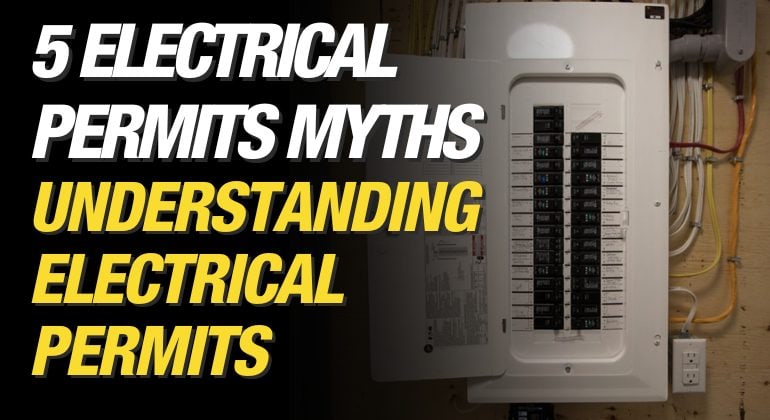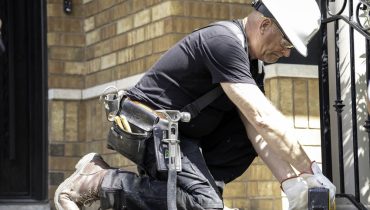The Skilled Trades That Are In Demand A significant number of skilled tradespeople are approaching retirement. This is creating a shortage and a need for new talent. The skilled trades...

5 Electrical Permits Myths – Understanding Electrical Permits
By Mike Holmes Jr
Mike’s Advice / Electrical
Tuesday, January 9th, 2024 @ 5:06pm
Do You Need To Apply For An Electrical Permit In Ontario?
You hear us talk about permits ALL THE TIME, and I know it can be confusing. Whether you’re renovating your space or taking on a custom build —it’s important to make sure the job is done right and that includes filing for the right permits. It’s not just about paperwork; it’s about ensuring your safety, that the work is done correctly, and is compliant with the current codes. There are a lot of things to know when you are a home or property owner —and electrical is a big one.
Let’s break it down and bust some common misconceptions homeowners have when it comes to electrical permits in Ontario.
Myth #1 – Building Permits and Electrical Permits Are The Same Thing
False! That’s actually a big misconception a lot of homeowners have.
Having a building permit doesn’t include your electrical work. Electrical permits are a whole different ball game. They ensure your electrical work is up to code and meets safety standards.
What is a Building Permit?
In Ontario your local building authority issues building permits if you want to build something, renovate something or tear down something, or change the purpose of a building. Also, in certain cases, such as those involving on-site sewage systems, boards of health and conservation authorities are in charge of enforcement.

In Ontario your local building authority issues building permits if you want to build something, renovate something or tear down something, or change the purpose of a building.
What is an Electrical Permit?
Another area that differs is ELECTRICAL, your local building authority DOES NOT issue electrical permits, nor does having a building permit mean your project is permitted for electrical work.
Electrical permits are a separate permit. In Ontario, electrical permits need to be obtained through the ESA or Electrical Safety Authority, whether you perform the work yourself or hire a LEC, which I highly recommend. Plus, the work still needs to be inspected and approved, with a Certificate of Acceptance by ESA.
Other provinces have their own electrical authorities, like the Technical Safety BC that issue permits.
Pro Tip: Residential notifications are valid for 12 months. The notification expires if no inspections have been performed during the first year.
The important take away is that getting a building permit is not the same as an electrical permit. However, the purpose is the same. A permit protects the interests of both parties.
By issuing a permit the municipality or the authorizing board can ensure that the work performed complies with the local building codes and bylaws. They also make sure it meets the objectives of health, safety, fire protection, accessibility and conversation —and check that you have a functional home.
READ MORE:
Find out more about filing for electrical permits and work notifications in Ontario
Myth #2 – Only Major Electrical Changes Require Permits
Most electrical work requires a permit. If the job is more complicated than tightening a wall plug or changing a face plate, I advise calling a licensed electrical contractor (LEC).
Switches and light fixtures rated at no more than 15 A and 130 volts may be replaced by homeowners in Ontario but recessed light fixtures and connections to aluminum and knob and tube wiring are not included. Be safe and smart, and don’t mess around with electrical. Hire a LEC!
Do I need a permit to upgrade my electrical panel?
Yes! When it comes to upgrading your electrical panel, getting a permit is a must. This isn’t a DIY project; it’s intricate work that requires a licensed electrical contractor.
You will also need the Local Utility to disconnect the power in order to safely complete the panel replacement. You will also need an ESA connection authorization before they can turn on the power to the new panel once more. Although homeowners are technically allowed to do this —this is not something I would ever recommend. It is a labour-intensive task comes with a lot of safety risks. LECs come equipped for unexpected events that may cause delays in getting the power turned back on or put you and your loved ones at risk of fatal shocks or electrical fires.
Trust me, messing with your electrical panel without the right expertise is a gamble you don’t want to take. A pro ensures your upgrade meets all the codes, keeping your home safe and compliant. Don’t risk it—hire a licensed contractor for this crucial job.
To find a licensed electrical contractor near you visit: myhome.eaton.com or if you are in Ontario, Canada visit findacontractor.esasafe.com
Pro Tip: Electrical Panels are the center of your home’s distribution and the safety of your investment and family. Panels, breakers and fuses, like all things only last so long, there are many factors in determining how long they will function properly but if you find that you cannot add that new circuit for your new feature because there are no spaces or breakers and other parts are no longer available, it is definitely time to consider an upgrade and the new panels can provide a lot more options and confidence to you.
READ MORE:
Do I need a permit to add electrical outlets?
Yes! In Ontario, the Electrical Safety Authority (ESA) requires homeowners to obtain an electrical permit when adding new outlets. Any modifications to the electrical system or wiring, including adding outlets, fall under ESA regulations, aiming to ensure safety compliance. As our good friend and Licensed Electrical Contractor, Frank, once said, any time a wire comes in or out of my truck you need a permit.
Therefore, homeowners in Ontario should begin by securing an electrical permit before installing new outlets to confirm that the installation will do what you need it to, safely, and forever. It is also the law in Ontario.
Myth #3 Electrical Permits Are Expensive And Take A Long Time To Approve
That depends on the circumstances. Electrical permit costs and lead times for approval depend on the complexity of the project. However, think about it this way. The cost of a permit is nothing compared to the cost of a potential electrical hazard. It is also often the least costly part of the project —costing under $100 for small projects even including residential Electric Vehicle charger installations.
Applying for a permit is also easier than a lot of homeowners think. In Ontario, you can call the Electrical Safety Authority at 1-877-ESA-SAFE (372-7233) and a customer service representative can help you apply for a permit and book an ESA inspection. LECs can also apply online through the ESA website.
Depending on where you live, typically an ESA inspector can sometimes even come the next day for the inspection. However, sometimes it can be a two-day turnaround or slightly longer especially in rural areas.
Pro Tip: For projects that are being fast-tracked, making these arrangements in advance will ensure that delays are eliminated or managed.
It may add a bit of time initially. However, having the correct permits in place can prevent delays later because you had to redo the work due to a failed inspection —which looks at safety and functionality. Like do you have enough receptacles in your kitchen and can they power your appliances?
Myth #4 – Anyone Can Apply For An Electrical Permit For The Electrical Work Done In My Home
Actually, in Ontario, the person who did the work is the one who is responsible for filing for a permit. If you did the work you can apply for the permit directly. However, we recommend you always hire a licensed electrical contractor to do the work. They have the experience to do the job safely. In this case, your contractor willbe the one applying for the permit.
If your contractor asks you to get the permits, that is a BIG RED FLAG!
Can a handyperson perform electrical work in my home?
So, if the “handyperson” happens to be a licensed electrical contractor then yes, they can perform the work involved and obtain the permits. However, If they aren’t an LEC, and they don’t own the home they are working on, then are not qualified and can’t legally perform the electrical work.
Licensed electrical contractors are highly skilled professionals who studied in-class college courses and apprenticed under seasoned journeymen for several years. While some electrical work may seem simple, but they are skilled at what they do and ensure the job is done safely and can identify and address any issues they find along the way.

Always hire a LEC to do the electrical work on your home. Frank Cozzolino is a Licensed Electrical Contractor that we trust to do the work on all our projects, why? Because safety first!
Is it illegal to do electrical work without being an electrician?
In Ontario, as the homeowner of the property you are legally allowed to perform electrical work. However, permits (within 48 hours of work being started), inspections and a certificate of acceptance must be obtained.
The notifications or permits must be taken out by the party that is performing the work.
Any electrical installations done by anyone other than the homeowner or a LEC with a permit is non-compliant and illegal.
How do you know if your DIY electrical work is legal or not?
If your electrical panel looks like a bowl of spaghetti, chances are it’s a DIY job. However, there are obvious signs that things aren’t right and you need to get it checked out by a pro!
Signs include:
- Circuit breaker issues
- Burning smells
- Buzzing
- Dimming or flickering lights
- Constant blown fuses
- Frequent light bulbs failing
- Frayed wiring
- Hot outlets or switches
- Dead outlets or switches
- Sparks from outlets
- Missing covers, or holes left in the panel
Looking for A Licensed Electrical Contractor? Check out ESA’s Contractor Look-up Tool to find a licensed electrical contractor in your area. They also have a database that tracks warnings and notices issued to contractors working without a permit. The database maintains the history of contractors, including investigations and/or prosecutions. You can report unlicensed or non-compliant activity here.
READ MORE
THE DANGER OF DIY ELECTRICAL WORK
Read more about protecting your homes from electrical fires.
Myth #5 – There Is No Way To Know If Permits Were Pulled Before I Moved Into My House
Check before you buy. It’s that simple. Before you buy or move into your new home, ask the previous homeowners for the permit history. You have every right to ask for this, and you should. If you live in Ontario, you can also call the Electrical Safety Authority and ask them for a permit history on the house – you just need the full address.
Find out more about how to request a record search from the Electrical Safety Authority in Ontario.
ELECTRICAL PERMITS FREQUENTLY ASKED QUESTIONS
Do HVAC contractors need an electrical contractor’s licence?
It depends on the extent of the work being performed and the credentials of the workers. Exclusions are:
- Refrigeration and HVAC systems mechanics
- Residential air conditioning systems mechanics
- Work done on electrical components of appliances by a person authorized, like Oil and Gas Pipeline Systems, Propane Storage and Handling, and Fuel Industry Certificates
Anyone engaged in this type of work should contact OCOT (Ontario College of Trades) and TSSA (Technical Standards and Safety Authority) to confirm their limitations. If an HVAC contractor is doing electrical work outside of the scope of these qualifications, then they would require an electrical contractor licence.
When do I book my inspection and how many inspections will I need?
Obtaining a “permit,” also known as a Notification of Work, should be your top priority and should be done as soon as possible, ideally before the electrical work begins.
Depending on the project, different ESA inspection and review procedures apply. For instance, if electrical work is intricate, ESA inspectors might need to check it at several stages.
Pro Tip: As a rule of thumb, it’s important to not cover any wiring, like putting up your drywall, before the inspection is complete. This way the inspector can properly assess the work done without you having to tear anything down or redo some of the reno work.
What are the different types of Residential Electrical Inspections?
Residential Electrical Inspections come in different forms based on the scope of work
New Residential: This type of work entails installing a wiring system in a building or other structure that was not wired before.
Renovation Residential: Any alteration to the original wiring, including device replacement and repair; however, if you are the owner and you live in your owner-occupied single-family home, you may lawfully replace certain light fixtures and switches without obtaining a permit. If you’re unsure if this pertains to your project, contact the ESA or contact a LEC.
It should be noted that a residential unit can have a basement or not. This group includes modular or prefabricated homes, row housing, duplexes, triplexes, quadruplexes, farmhouses, apartments and Condominium units as well as semi-detached homes.
When undergoing electrical inspections for new or renovated homes, different stages may be involved:
TRENCH: is used to inspect underground wire.
SERVICE/CONNECTION: inspection includes meter wiring, the main disconnect devices (fuses or breakers), and the grounding of the service. Service raceway, point of attachment for overhead services and service conductors.
ROUGH-IN: This is the stage before wiring is covered up with drywall, insulation, vapour barrier, etc., and occurs after all branch circuit wiring and outlet boxes are installed.
FINAL: As soon as the electrical installation is finished, request the final inspection.
What is a Certificate of Acceptance?
A certificate of acceptance is a guarantee that the electrical work completed has been permitted and approved by an ESA inspector. It is an important document to have with all your home maintenance and improvement documents. Plus, it is important to have these for insurance purposes and when you plan to sell your home.
Electrical is complicated, and we rely on it for almost everything in our lives. Good or bad, it’s essential that our homes are safe and that we have the necessary power supply for all our needs. Understanding the importance of electrical permits and hiring a LEC to do the job correctly, will ensure your home and family is safe.
RELATED:
Hiring a Licensed Electrical Contractor in Ontario: When And How
How to Hire a Licensed Electrical Contractor For Your Electrical Work







